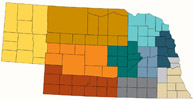Extension, Cooperative

Nebraska Cooperative Extension: Faculty and Staff Publications
Document Type
Article
Date of this Version
9-9-2022
Citation
Calloway, E.E.; Nugent, N.B.; Stern, K.L.; Mueller, A.; Yaroch, A.L. Lessons Learned from the 2019 Nebraska Floods: Implications for Emergency Management, Mass Care, and Food Security. Int. J. Environ. Res. Public Health 2022, 19, 11345. https:// doi.org/10.3390/ijerph191811345
Abstract
This qualitative study aimed to understand the actions, challenges, and lessons learned for addressing the food and water needs of flood survivors, with a special focus on vulnerable populations and the implications for food security, to inform future disaster response efforts in the U.S. Semi-structured in-depth interviews were conducted from January to August 2020 with the local, state, and national stakeholders (n = 27) involved in the disaster response to the 2019 Nebraska floods, particularly those involved in providing mass care, such as food, water, and shelter, for the flood survivors. The challenge themes were related to limited risk awareness and apathy, the large scope of the impact, the difficulty with coordination and communication, the challenges in risk communication, the limited local-level capacity, and the perceived stigma and fear limiting the utilization of governmental assistance. The mitigation recommendations included the need to consider zoning and infrastructure updates, the implementation of efficient systems that leverage technology for coordination and communication, and guidance on how to address certain human factors. This study reinforces previous findings related to flood disasters and adds to our understanding of disaster response and food insecurity. The practical takeaways from this study can inform future flood-related disaster mitigation approaches in Nebraska and other rural areas.
Included in
Agricultural and Resource Economics Commons, Agricultural Education Commons, Food Science Commons, Rural Sociology Commons


Comments
Open access.